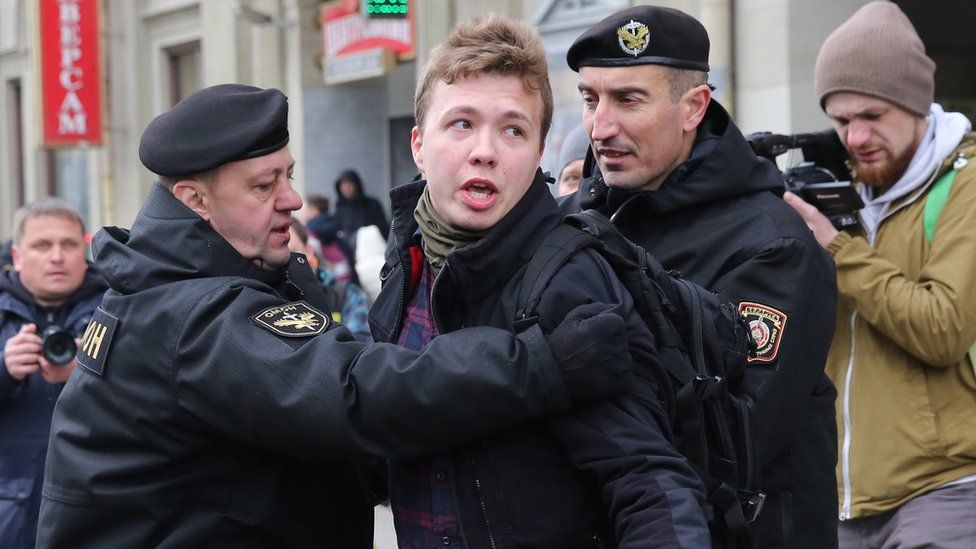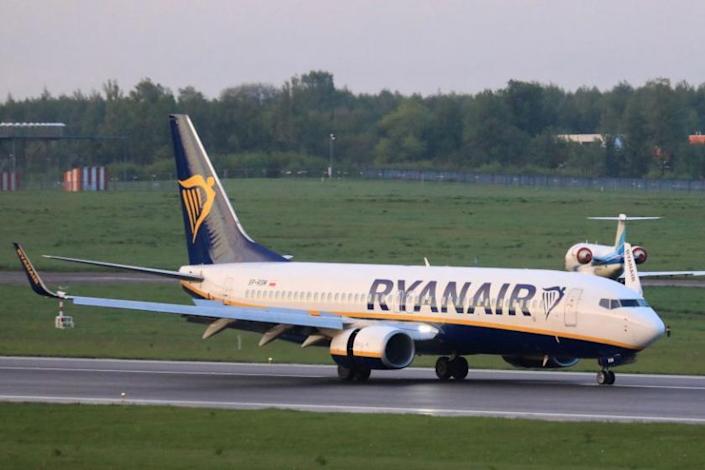Western countries have expressed outrage at the forced diversion of a plane carrying a Belarusian activist on an internal EU flight on Sunday.
EU leaders are due to discuss their response to what the union's executive called a "hijacking" and the US state department said was "a shocking act".
Belarus forced the plane, which was bound for Lithuania, to land in Minsk claiming a bomb threat to the aircraft.
It arrested the Belarusian journalist and activist Roman Protasevich.
The 26-year-old was aboard the Ryanair plane, which was flying from Athens. The aircraft was due to land in Vilnius but was still in Belarusian airspace when Belarusian authorities scrambled a fighter jet and diverted it to the country's capital.
Witnesses said the activist was "super-scared" and told fellow passengers he would face the death penalty.

State media in Belarus said President Alexander Lukashenko had personally given the order for the move. The plane landed in Vilnius more than six hours after its scheduled arrival.
Since winning a disputed election last August, 66-year-old Mr Lukashenko, who has ruled the country since 1994, has cracked down on dissenting voices. Many opposition figures have been arrested while others fled into exile.
The incident drew sharp condemnation from across the European Union, with countries urging the immediate release of Mr Protasevich and a full investigation.
The president of Lithuania, Gitanas Nauseda, urged the EU to impose fresh economic sanctions on Belarus at Monday's meeting of union leaders.
He told the BBC that such steps "could make a larger impact on the behaviour of the Belarusian regime".
Dozens of Belarusian officials, including President Lukashenko, are already under EU sanctions including travel bans and assets freezes, imposed in response to the repression on opponents.
Ursula von der Leyen, head of the European Commission, said "the outrageous and illegal behaviour... will have consequences".
US Secretary of State Antony Blinken condemned the "shocking act" and said President Joe Biden's administration was "co-ordinating with our partners on next steps".
The head of the US Senate Foreign Relations Committee, Bob Menendez, issued a statement with some of his European parliamentary counterparts denouncing "an act of piracy" and calling for a ban on flights over Belarus.
How was the flight diverted?
Flight FR4978 turned east to Minsk shortly before it reached the Lithuanian border. Greece and Lithuania put the number of passengers on board at 171.
In a statement, Ryanair said the crew had been "notified by Belarus (Air Traffic Control) of a potential security threat on board and were instructed to divert to the nearest airport, Minsk".
The flight path, visible on the Flightradar24 website, suggests the plane was actually nearer to Vilnius than Minsk when it turned.
Ryanair said checks in Minsk found "nothing untoward", but made no mention of Mr Protasevich. The plane finally landed in Vilnius at about 21:30 local time (18:30 GMT).
Some passengers described seeing Mr Protasevich looking nervous as the incident unfolded. "He just turned to people and said he was facing the death penalty," Monika Simkiene told AFP news agency.
Another passenger told Reuters news agency that Mr Protasevich had opened an overhead locker after they were told of the diversion, pulled out a laptop and a phone and gave them to a female companion. She was not allowed to re-embark the flight, the Lithuanian president said.
Will outrage be echoed by action?
Analysis box by James Landale, Diplomatic correspondent
How should the EU respond when a plane travelling between two of its capitals is forced to land in a third country so a government critic can be arrested? That is the question European leaders must answer when they meet in Brussels.
The arrest of Roman Protasevich has provoked a chorus of international outrage but will that be echoed by action? Some leaders - including the Polish prime minister - have already called for fresh sanctions on President Lukashenko's authoritarian government.
Eight foreign affairs committee chairmen from the UK, the US and the EU said flights over and to Belarus should be banned for what they described as an act of piracy.
Some officials even suggested cars and lorries could be stopped from entering the EU from Belarus. Mr Lukashenko has shown how far he is prepared to go to suppress opposition after disputed elections last year. The EU now has to decide what price it is prepared to make him pay.
line
Why would Mr Protasevich have been targeted?
Mr Protasevich is a former editor of Nexta, a media operation with a Telegram channel. He left Belarus in 2019 to live in exile in Lithuania. From there he covered the events of the 2020 presidential election, after which he was charged with terrorism and inciting riots.
Nexta played a key role for the opposition during the vote, which was won by Mr Lukashenko and is widely regarded as rigged. It has continued to do so in its aftermath, particularly with the government imposing news blackouts.
But he first attracted the attention of the authorities as a teenager, being expelled from school after taking part in a protest in 2011.
Mr Protasevich now works for a different Telegram channel, Belamova. He stepped in to write for it after blogger Igor Losik was arrested by the Belarusian authorities in June last year.
He was in Athens to attend an economic conference along with Svetlana Tikhanovskaya, the opposition leader who claimed victory in the election. She too now lives in exile in Lithuania.
Tens of thousands of protesters thronged the capital Minsk for months last year, furious at Mr Lukashenko's declaration of victory. There have been numerous cases of police brutality and some 2,700 prosecutions this year alone.
BBC





